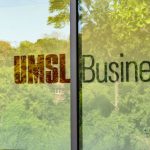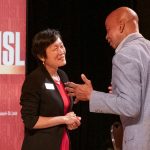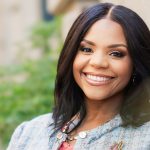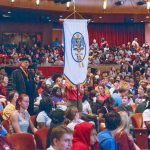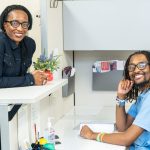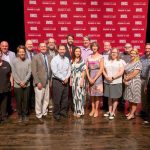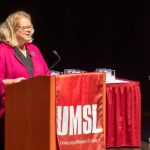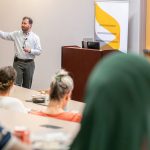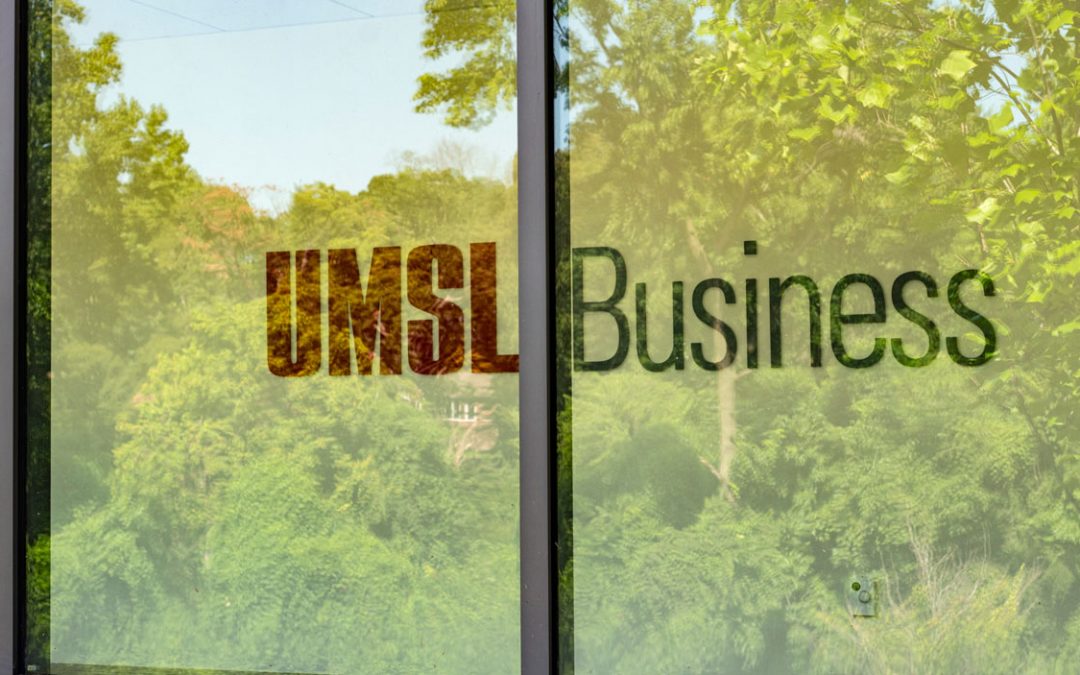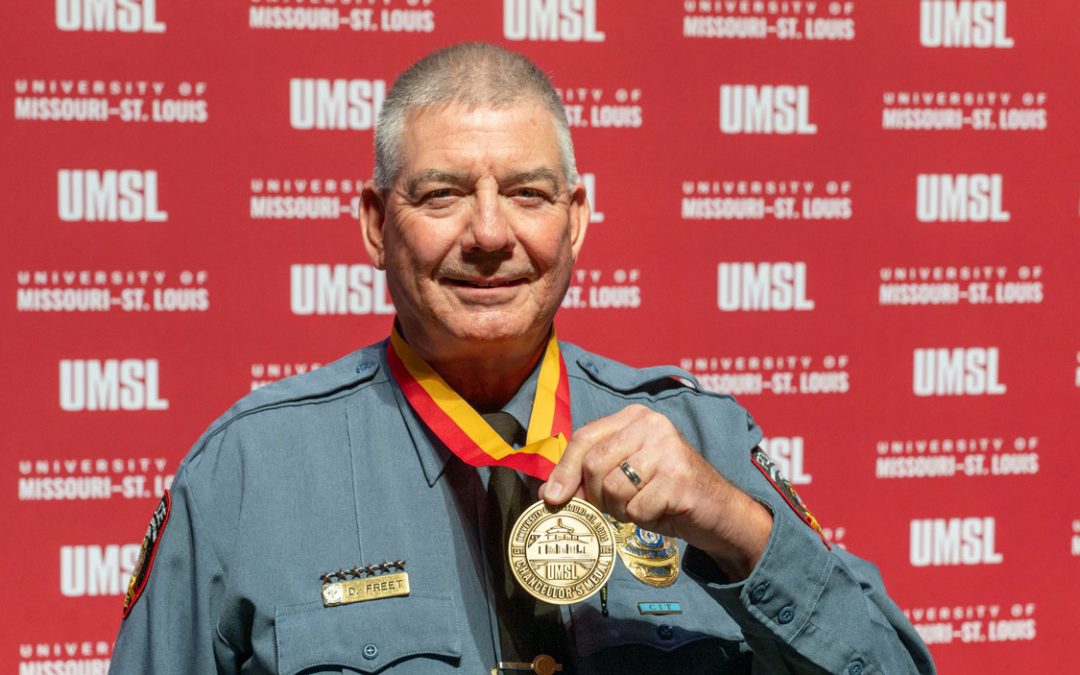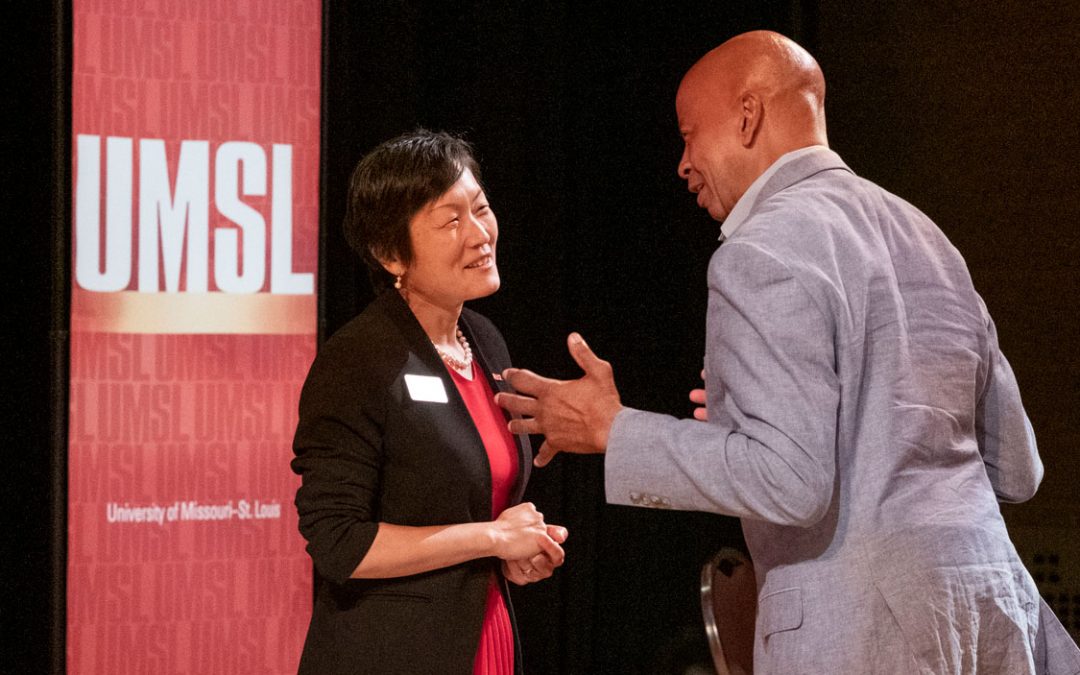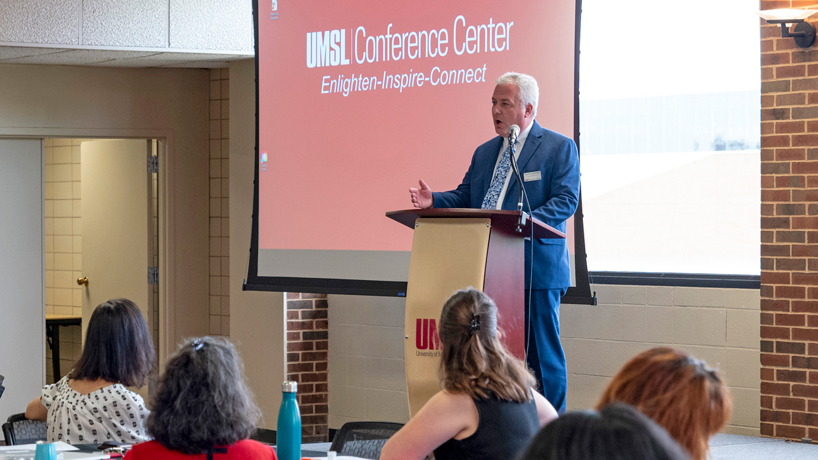
Provost and Interim Vice Chancellor for Academic Affairs Steven Berberich delivers opening remarks at the 20th annual Cambio de Colores Conference in the Summit Lounge last week. The three-day, multistate conference focused on the integration of Latin@s/Latinxs/Hispanics and immigrants in the Midwest. (Photo by August Jennewein)
Wednesday afternoon, more than 50 interdisciplinary professionals from across the Midwest gathered in the Summit Lounge at the University Missouri–St. Louis to kick off the 20th annual Cambio de Colores Conference.
Provost and Interim Vice Chancellor for Academic Affairs Steven Berberich welcomed the group to the university during his opening remarks.
“This is the 20th year of the conference, which means that the Cambio de Colores has a long history of bringing together researchers, practitioners, policymakers, students and others to exchange their work, as you’re going to do over these next couple of days, to create an interdisciplinary network that shares experiences, research and best practices to support immigration integration,” Berberich said. “The University of Missouri–St. Louis is pleased to serve as the host of this year’s event.”
Last week’s three-day, multistate conference focused on the integration of Latin@s/Latinxs/Hispanics and immigrants in the Midwest. People from various fields who work with those communities came together to share research and best practices to facilitate the integration of newcomers.
The conference was founded to address changes in rural and urban communities throughout the Midwest that have been reshaped by the arrival of immigrants and refugees. Over the past two decades, the conference has served as a hub for stakeholders to explore how communities are adapting to these changes and how to enhance immigrant integration and community well-being.
The theme of this year’s event was “Floreciendo–Resilience and Changing Communities in Uncertain Times.” Corinne Valdivia, professor at the University of Missouri–Columbia and interim co-director of the Cambio Center, explained that the Spanish term “floreciendo” literally translates to “blooming” but also expresses the ideas of renewal and resilience.
In line with that theme, speakers discussed modern uncertainties and challenges facing Latin@s/Latinxs/Hispanics and immigrants in breakout sessions such as “Creating Pathways for Access to Higher Ed for All,” “Employment Discrimination in the Latinx Community,” “Resilience and Leadership During Uncertainty,” “The Promise of the Future: Youth Development and the New Dynamics for Latinx Families,” “Sentiments and Experiences on Migration: Latinx Pathways to Succeed” and “When Culture Matters: The Need to Improve Health Services.”
“The work that will come from the exchange of ideas will help address uncertainties communities continue to face due to the COVID-19 pandemic, climate change, forced displacement, economic challenges and social unrest in the United States and around the world,” Berberich said. “We here at UMSL are committed to the work being done to support all communities.”
Berberich highlighted UMSL’s work in the north St. Louis County community in particular. As a founding member of the Anchor Institution Initiative, the university is dedicated to community engagement and economic development aimed at building a stronger St. Louis County. He also pointed to the Anchor Action Network, which UMSL and Edward Jones are co-leading.
Vice Chancellor for Diversity, Equity and Inclusion Tanisha Stevens also addressed the crowd, noting that the pandemic highlighted, and often exacerbated, a number of important issues. She stressed the importance of continuing to address inequities that communities of color face.
“With that, and that importance of understanding and accepting what our new normal is, it’s important to also reflect on looking at areas and those barriers that systemically impact all of us and finding and engaging in conversations and creating space to be comfortable in being uncomfortable, as we like to say,” she said.
Berberich closed his remarks with an inspiring vision for the future.
“We seek to build inclusive prosperity among Black and Brown communities in the region,” he said. “Our mission at UMSL is to transform lives. The Cambio Center’s work is to help understand the demographic changes in our communities, and to provide knowledge and best practices to facilitate a smooth integration of newcomers and immigrants of all backgrounds to Missouri and the Midwest. Together, we can make a difference in St. Louis, in Missouri and in the Midwest.”
For more information on the Cambio Center and the Cambio de Colores Conference, visit: cambioconference.wordpress.com


